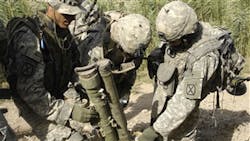Researchers eye new biological sensors to detect underground objects like buried chemicals and weapons
ARLINGTON, Va. – U.S. military researchers are asking two companies to develop new kinds of biological sensors that can detect underground disturbances or the presence of buried chemicals or weapons.
Officials of the U.S. Defense Advanced Research Projects Agency (DARPA) in Arlington, Va., are looking to Raytheon BBN Technologies Corp. in Middletown, R.I., and Signature Science LLC in Austin, Texas, for the BioReporters for Subterranean Surveillance program.
This project seeks to use indigenous and engineered organisms to sense changes of interest to military commanders in natural and built environments. Raytheon BBN and Signature Science won separate $1.6 million contracts for the Subterranean Surveillance program last week.
The two companies will perform laboratory research and proof-of-concept demonstrations of biological sensing systems in well- controlled field tests that take advantage of recent advances in microbial science and synthetic biology to develop biological sensors, signal transducers, and reporters that can reveal subterranean phenomena at a distance.
Related: Soon after Iran deal, Air Force looks for new ways to find and attack deeply buried targets
Bio Reporters should be able to sense a phenomenon at least one meter below the surface, propagate a signal to the surface within seven days, and be continuously detectable on the surface at a distance of 10 meters over the subsequent seven days.
Biological reporter systems have been developed to provide high sensitivity in a variety of environments, and some offer stand-off reporting, yet do not have sufficient capability to detect subterranean events, DARPA officials explain.
Mechanical detectors have been developed for sensing events of interest below ground, but they require precise positioning and do not cover large areas.
Related: Raytheon develops computer-equipped sensor to locate tunnels and land mines
Instead, DARPA researchers want Raytheon BBN and Signature Science experts to take advantage of the extensive biological networks that exist underground to monitor large areas to increase the military's ability to detect subterranean events without the need for precise coordinates.
The Bio Reporter study will last for 18 months. The study and prototyping includes lab-scale demonstrations and field trials of proposed technologies involving subterranean sensing, signal propagation to the surface, and stand-off detection of the bio reporter.
For more information contact Raytheon BBN Technologies online at www.raytheon.com/capabilities/innovation, Signature Science at www.signaturescience.com, or DARPA at www.darpa.mil.
About the Author
John Keller
Editor-in-Chief
John Keller is the Editor-in-Chief, Military & Aerospace Electronics Magazine--provides extensive coverage and analysis of enabling electronics and optoelectronic technologies in military, space and commercial aviation applications. John has been a member of the Military & Aerospace Electronics staff since 1989 and chief editor since 1995.
